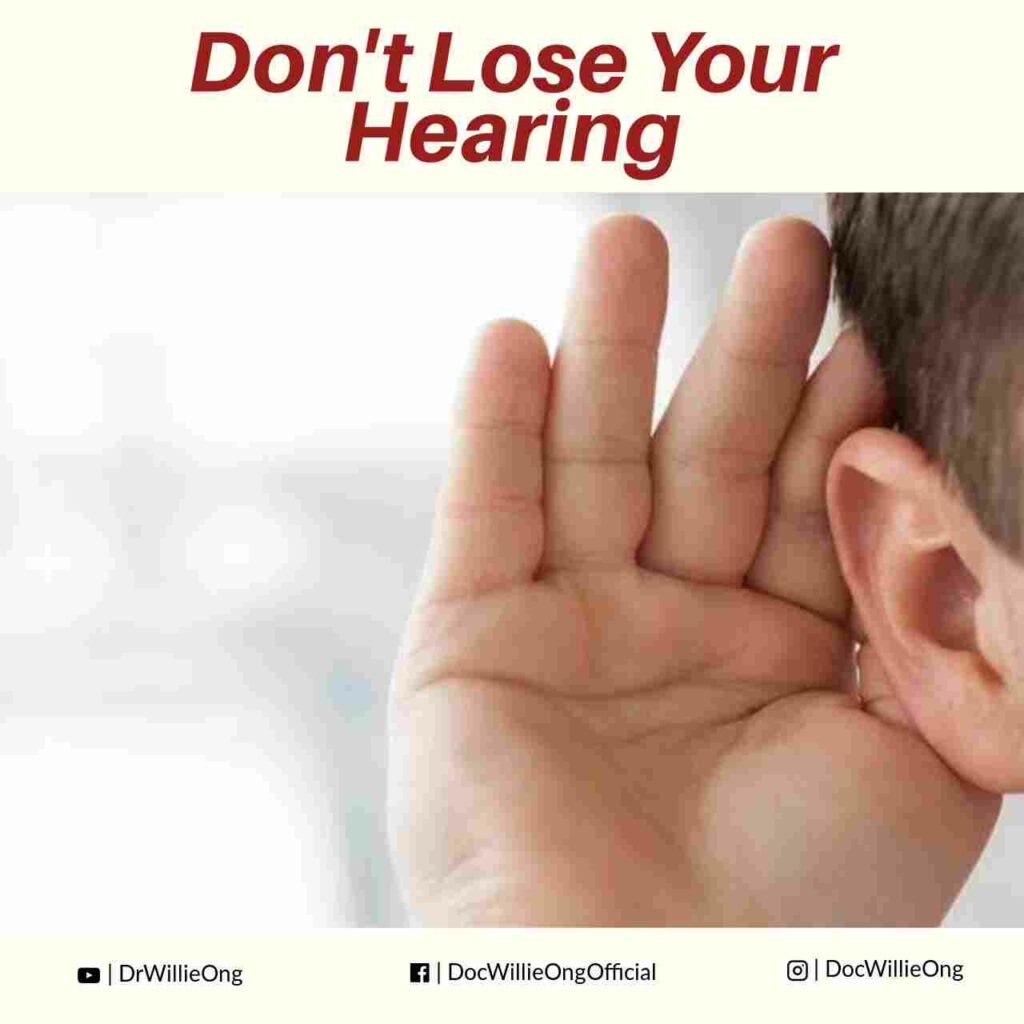Dr. Willie Ong (Internist and Cardiologist)
Many people take their ears for granted. That is, until they lose their hearing. Studies show that almost 60% of people will experience some hearing loss by the age of 65. And 40% will have severe hearing loss that requires the use of hearing aids. As one ear specialist says, “Hearing loss does not run in families, it runs in humans.”
People hear on two frequency ranges: high frequency (like rustling leaves) and low-frequency (like the speaking voice). As we get older, we first lose our ability to hear high frequency sounds.
How then do we preserve our hearing? Here are the strategies to protect your hearing:
- Turn the volume down. The worst damage you can inflict to your ears is to bombard it with loud sounds. NOISE, NOISE, NOISE. It’s the biggest threat to your hearing. If you tend to watch too many rock concerts, you will develop mild hearing loss and possibly tinnitus, which is ringing of the ears. With our latest technology, improper use of iPods and MP3 Players can cause deafness. According to Dr. Michael Ellis, Professor at Louisiana State University School of Medicine, if you are sitting next to a friend and you can hear the music through his earphones, then that is already too loud.
- Avoid noisy surroundings. Whether at home or in the office, if you are subjected to constant noise (like airplanes and machinery noise), you should consider wearing earplugs to muffle the sound. Moreover, recent studies show that those subjected to loud sounds are at a higher risk for a heart attack. The explanation seems to be that noisy surroundings may have a harmful effect on the body’s metabolism.
- Bring your earplugs. Aside from carrying your sunglasses (to protect your eyes), it pays to bring your earplugs, too. At what level of sound should you start using earplugs? Studies show that prolonged exposure (more than eight hours) to sounds greater than 85 decibels can lead to hearing loss. Authors Dr. Michael Roizen and Dr. Mehmet Oz write that if one has to raise his voice in order to be heard, then the surrounding noise level is already 85 decibels. Let us look at the following table. Take note that a sound of 140 decibels (a gunshot at arm’s length) can cause immediate ear damage.
| Type of Sound | Intensity level |
| Threshold of hearing and near-total silence | 0 |
| Rustling leaves | 10 |
| Whisper | 20 |
| Normal conversation | 60 |
| Busy street traffic | 70 |
| Vacuum cleaner, Loud snoring | 85 (danger levels) |
| Large orchestra | 90 |
| Music player at maximum level | 100 |
| Front row at rock concert or jet engine | 120 |
| Threshold of pain | 130 |
| Sound near a gunshot | 140 |
| Instant perforation of eardrum | 160 |
- A medical saying goes, “Don’t put anything in your ear smaller than your elbow.” Our ears are perfectly designed for hearing and have a self-cleaning mechanism. Ear wax has a purpose, which is to catch dirt that may lodge inside the ear. Fine hairs in the ear canal constantly propel earwax out. Hence, doctors strong discourage the use of cotton buds. “Too often, cotton swabs push wax further into the ear canal, causing an impaction or even perforating the delicate ear drum,” says Dr. Ellis. “Never use swabs for anything but cleaning the outer ear.” This is a problem because a study shows that three out of four people use cotton buds regularly to clean their ears.
- Keep your ears dry. After taking a bath, the most you can do to clean your ears is to get a towel, wrap this around your little finger, and gently poke your ears dry. Try not to get water inside the ears while taking a bath. If this should happen, tilt your head and allow the water to drain out naturally. Soon it will dry up. However, if the water in the ear persists, you can place a few drops of rubbing alcohol inside your ear to dry it up.
- Keep your ear gadgets clean. If you wear headphones or use ear plugs, make sure that germs are not getting inside your ears. Use cotton and alcohol to wipe these gadgets clean. A study shows that up to 700 times more germs can be pushed inside the ear if you use dirty headsets. Be careful.
- Chew gum on a plane. Whether you’re flying on a plane, or riding a high-speed elevator, you may experience some ear discomfort. This is because the pressure inside your ear will be different from the pressure outside, causing your eardrums to swell. To prevent this, try swallowing or chewing gum. This action helps open the Eustachian tubes (tube between the nose and ear) and temporarily equalizes the pressure inside your ears. That is why you should not sleep when the plane is descending. Stay awake and pass the gum.
- Check your child’s hearing. There are certain instances that can harm your child’s hearing. Pregnant women who get sick from viral diseases, such as measles, German measles or mumps, are at very high risk of giving birth to a hearing-impaired baby. Children who develop mumps, measles, whooping cough, or any high fever, can also suffer from hearing loss. If you suspect your child to have a hearing problem, consult your doctor. Adults should likewise have their ears checked every two years. Protect your hearing and enjoy life more.

